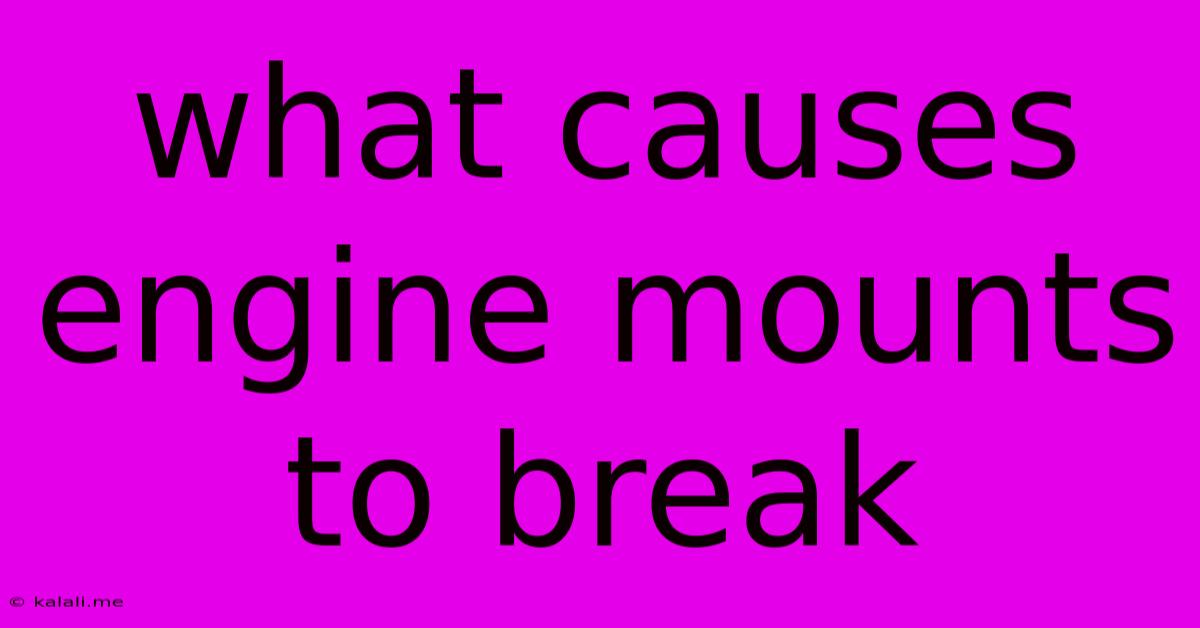What Causes Engine Mounts To Break
Kalali
Jun 08, 2025 · 3 min read

Table of Contents
What Causes Engine Mounts to Break? A Comprehensive Guide
Engine mounts, also known as motor mounts, are crucial components that secure your engine to the vehicle's chassis. They absorb vibrations and impacts, ensuring a smooth ride and protecting the engine from damage. But like any part, engine mounts eventually wear out and break. Understanding the causes of engine mount failure can help you prevent costly repairs and ensure your vehicle's longevity. This article will explore the common culprits behind broken engine mounts.
The Usual Suspects: Age and Wear & Tear
Perhaps the most common reason for engine mount failure is simply age and wear and tear. Rubber, the primary material in most engine mounts, degrades over time due to exposure to heat, oil, and other elements within the engine bay. This degradation leads to cracking, hardening, and ultimately, failure. This is a natural process and is unavoidable, though regular inspection can help identify problems early. Think of it like the tires on your car – they need replacing eventually, and so do engine mounts.
Excessive Vibration and Stress
Engines produce significant vibration, especially during acceleration, deceleration, and idling. Excessive vibration, often stemming from issues like a misfiring engine, imbalanced wheels, or a worn transmission, puts immense stress on the engine mounts. This constant jarring can accelerate the deterioration of the rubber components, leading to premature failure. Regular vehicle maintenance, addressing any underlying engine problems promptly, can greatly reduce this stress.
Harsh Driving Habits
Aggressive driving habits, such as frequent hard acceleration and sudden braking, significantly impact the longevity of engine mounts. The intense forces generated during such maneuvers place considerable strain on these components. Driving too aggressively is a major contributor to premature wear and tear on many vehicle parts, and engine mounts are no exception. Smoother driving significantly extends their lifespan.
Accidents and Impacts
Major impacts, such as those resulting from accidents, can cause immediate and catastrophic engine mount failure. The force of a collision can easily tear or severely damage the rubber mounts, rendering them unable to perform their function. Impact damage is often immediately apparent and will require immediate replacement of the affected mounts.
Fluid Leaks
Oil, coolant, or other fluids leaking onto the engine mounts can also accelerate their degradation. These fluids can penetrate the rubber and cause it to soften, swell, and eventually crack. Fluid exposure is often gradual, so regular checks for leaks and timely repairs are key in preventing this type of damage.
Overloading the Vehicle
Carrying excessive weight consistently, beyond the vehicle's recommended capacity, puts additional strain on the engine and its mounts. This constant extra weight contributes to premature wear and tear, similar to aggressive driving. Overloading can quickly degrade the lifespan of various vehicle components, including engine mounts.
Recognizing the Symptoms of Failing Engine Mounts
Understanding the signs of failing engine mounts is crucial for timely repairs. These may include:
- Excessive engine vibration: Noticeable shaking or trembling felt inside the cabin.
- Unusual noises: Rattling, banging, or knocking sounds emanating from the engine bay.
- Engine movement: Visible movement or shifting of the engine during acceleration or deceleration.
- Difficulty shifting gears: A rough or hesitant gear shift may indicate mounting issues.
Ignoring these symptoms can lead to more severe problems, potentially damaging other engine components.
By understanding the common causes of engine mount failure and recognizing the warning signs, you can proactively maintain your vehicle's health, avoid expensive repairs, and enjoy a smoother, more reliable ride. Regular maintenance and safe driving practices are key to extending the life of your engine mounts.
Latest Posts
Latest Posts
-
Lawn Mower Runs For 5 Minutes Then Dies
Jun 08, 2025
-
How To Install Dmg File On Mac
Jun 08, 2025
-
Wakfu Osascript Wants To Make Changes
Jun 08, 2025
-
Is Grease Is Necessary For Home Circuit Breakers
Jun 08, 2025
-
How To Vent A Portable Air Conditioner Without A Window
Jun 08, 2025
Related Post
Thank you for visiting our website which covers about What Causes Engine Mounts To Break . We hope the information provided has been useful to you. Feel free to contact us if you have any questions or need further assistance. See you next time and don't miss to bookmark.